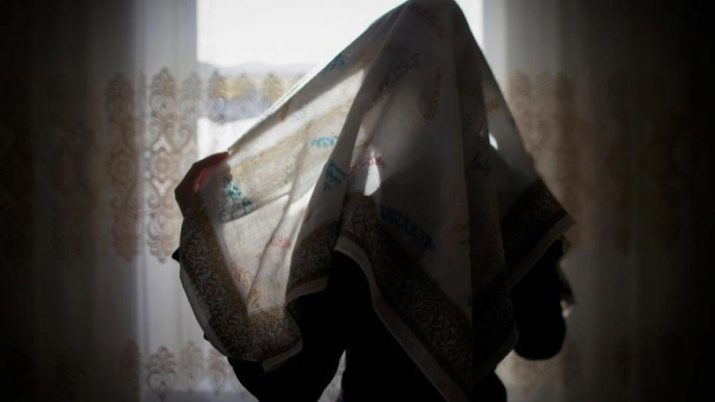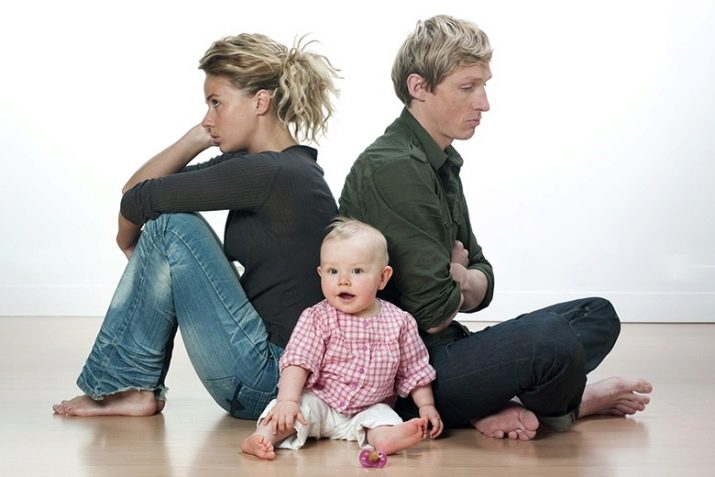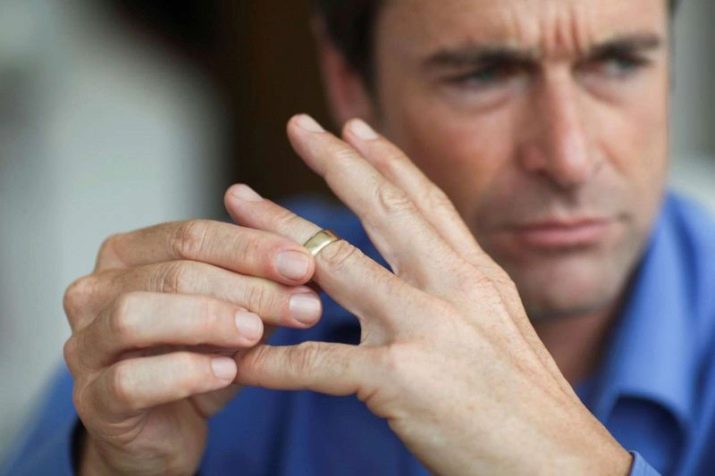The number of divorces in Russia today is a record - almost every second marriage ends with a divorce. And this cannot but make you think: on the one hand, the state is trying to do everything to maintain the image of the family, and on the other hand, for some reason, families are not getting stronger. About what reasons lead to divorces, how divorces go when they are inevitable, and how to survive this event, this article will be discussed.

What it is?
Divorce is the termination of an existing marriage between spouses. Since civil marriages have been recognized to a certain extent recently by law, the separation of the couple who lived without seals in passports can be considered a divorce.
In history
Once in Russia, getting a divorce was almost impossible. The reasons for allowing the dissolution of the marriage were quite compelling; they had to be proved to the clergyman in order to receive the so-called adjustable letter, witnesses were also needed, and words alone were not enough. A couple could breed under the following proven circumstances:
- adultery;
- bigamy or bigamy;
- a disease in a man or woman who was before marriage and which interferes with the fulfillment of conjugal duty, childbearing, living together;
- disappearance of a husband or wife without a trace (5 years ago or more);
- sentencing a husband or wife for a grave and especially grave crime against the law;
- monasticism of a husband or wife (only if there were no young children).

Important: after the termination, the culprit usually lost the right to enter into a new marriage.
In those days, divorces were very rare: in 1899 there were only one divorced per thousand men, and two divorced women per thousand women.
Everything changed in 1917. After the revolution, attitudes toward divorce softened. They began to breed in the registry offices, and immediately after the filing of such a petition by one of the spouses. Joseph Stalin somewhat tightened the divorce procedure, and his follower Nikita Khrushchev again simplified it. Thus, by 2008, already 60% of marriages ended in divorce.
Technically, divorce today is not a particularly complicated procedure. If the husband and wife do not have children, you can resolve the issue of divorce at the registry office by written will of one or both of the partners one month after the submission of the relevant application. The registry office also divorces spouses with children, but only on condition that one of them is recognized as missing in court, legally incompetent, or sentenced to a prison term of more than three years. In other cases, bred in court.

In religion
The Orthodox faith today permits divorces not only because of adultery, but also in a number of other cases:
- withdrawal of the partner from the Orthodox faith;
- venereal disease;
- infertility;
- long absence or missing;
- imprisonment;
- physical attempt on the life of a wife or children;
- untreatable mental illnesses;
- AIDS;
- use of drugs and alcohol;
- abortion performed if the spouse did not give permission for such actions to the wife.

The Catholic Church does not recognize divorce: getting married or remarrying with the blessing of a clergyman is possible only in the event of the death of the first spouse. However, there are some conditions that make it possible to recognize a marriage annulled, but only on a formal level. The second marriage after that, the church considers illegal. A marriage between a Catholic and a representative of another faith is not considered legal, from the point of view of the church, and therefore such divorces are not condemned.
Protestants allow divorce only because of adultery, further divorced are forbidden to build new family relationships. Judaism does not encourage divorce, but in some cases allows. However, if the spouse refuses to give his wife consent to divorce their marriage, the position of the woman will be very unenviable - she will not be able to enter into a new relationship until her ex-husband dies.
A divorce in Islam is made by a Sharia judge at the request of a husband or wife. The grounds for divorce can be quite a lot. Each case is considered individually.

In psychology
Divorce is not just some kind of legal and actual action, it is always a big psychological trauma, which, first of all, affects children - due to age and lack of life experience, children are not always able to understand and make their parents' decisions painlessly. In psychology, the state after a divorce is considered identical with the state after the loss of a loved one, his death. The more painful the divorce process was, the more likely it is that the consequences for the child’s psyche will still be: the accumulation of anxiety, a feeling of lack of protection, the collapse of the familiar world, and in adulthood such people may be wary of relations with the opposite sex, because the fear of repeating a script familiar from childhood may be too strong.
Unfortunately, more and more former spouses drag children into litigation. Some human rights defenders and specialists in the field of clinical child psychology propose to qualify such actions of parents as “child abuse” and establish responsibility for this.

Is it good or bad?
When lovers marry, they rarely think that divorce is possible in principle. At the same time, divorce is not worth evaluating as something bad or something good. It is neutral in itself. It all depends on the conditions in which the family breaks up, as well as the attitude of the participants in the process towards this.There are situations when a divorce is really like a tragedy: you were abandoned, you are pregnant, you have been cheated, you have small children who are equally fond of both mother and father. In this case, divorce is perceived and experienced painfully.
But there are situations where divorce is good for everyone. These include, first of all, situations that develop in destructive families.
If one of the spouses abuses alcohol, drugs, uses violence against a partner, children, and beats, then a divorce is not only the legal removal of responsibility for marriage, but also a real life-saving - for her and her children.

During a life together from a wedding to a divorce, partners show and show not only their very best qualities. Very often in the very first years of life negative personality traits appear, but so far they generally fit into the worldview of the second spouse, if he does not consider them terrible vices, the couple may well be a normal and strong family. Everything changes if the remaining family members begin to suffer because of the revealed negative qualities: from lack of money, if the spouse does not want to work, drinks, from beating, if he is a home tyrant, from fear for his life.
Divorce becomes good and salvation if three important factors coincide:
- there are difficult and confusing relationships between spouses that prevent them from adequately interacting in significant events (joint raising of children, providing them with everything necessary);
- spouses fail to find contact; contradictions are observed in almost all areas of life;
- unsolved significant problems lead to severe emotional stress, which in turn precludes any attempt at dialogue.

So the circle closes. There is no way out of it, only a divorce. You can save a family, but only on condition that at least one of the three factors described above will be amended.
Deciding on a divorce, even if all the criteria are met, can be very difficult. It turns out a completely unbearable situation in which the only way out is blocked. Psychologists call this a pathogenic adjustable situation - a couple is already in fact and not a couple, does not solve anything together, there is no love and respect, understanding and common goals, tons of grievances have accumulated, the spouses are not looking for reconciliation and solving misunderstandings, but they continue to be married, live together. In fact, both are powerless - they can not do a single productive action either in the direction of peace or in the direction of divorce.
It is most difficult for children in pathogenic families. At first they try to act as peacekeepers and mediators, but then they realize that they do not succeed, they lose faith not only in themselves, but also in adults. Functions and roles in such families are displaced, distorted. Everyone is experiencing tremendous stress, including children. If everything is left as is, it is possible that problems will seek a way out, but through the behavior of children, through somatic and mental illnesses in children and adults.

Important: in pathogenic families, love is often replaced by co-dependence.
In pathogenic families, the only sensible and courageous solution is divorce. The marriage will break up, but the life and health of each individual family member can be preserved.
Statistics
Today in Russia, up to 53% of couples who had previously entered into legal marriage are divorced. Such statistics are regularly kept by registry offices and once a year provide data on the percentage of marriage and divorce. But these statistics are not only remarkable for the total number of divorced Russians, but also for certain nuances that make it possible to better understand who and how are getting divorced in our country.
According to recent data, couples who have been married for 5 to 9 years are more likely to get divorced. Almost every third cell of society (28.5%) disintegrates among such families. Spouses who have been married for up to a year are divorced less often than others - 3% of the total number of divorces. But those who have lived together for 1-2 years already behave differently: almost 16% of marriages break up.A little more (18%) of couples get divorced after 3-4 years of living together. Every fifth family breaks up among marriages with an experience of 10 to 19 years. Among those who have lived together for more than 20 years, the percentage of those who divorce is not so high - about 11%.
The most “conflicting” are spouses aged 20 to 30 years. But at the same time, marriages concluded in this age period are stronger and break up much less frequently than marriages in which spouses have entered after their thirtieth birthday. This can be explained by the relative mobility of emotions and the psyche under the age of 30 years, after this milestone it can be much more difficult for people to “redraw” their views and habits, which is what the family requires of them.

Courts still use the practice of “thinking time”, giving spouses the opportunity to once again think about their decision.
At the same time, only 7% of couples withdraw their claims. The rest remain true to their original decision and continue to insist on termination.
According to statistics, divorce initiators are most often women - up to 68% of cases. If the couple is “experienced”, and the spouses are more than 50 years old, then here the initiators are more often men.
After a divorce, according to statistics, about 60% of women enter remarriage, but only half of them admit that they finally found happiness. Up to 85% of divorced men re-marry and consider the new relationship more successful than the first (about 70% of them).

Main reasons
Previously, the reason why the spouse requires a divorce had to be indicated in a statement, argued in court. Today, husband and wife have every right to keep their secret, if they do not want to voice the reasons, they will divorce them without disclosing this information. But sociologists and psychologists studying the intricacies of marital relationships continue to explore the reasons why families still break up.
- The marriage decision was rash (as an option - the marriage was fictitious). This is the most common cause of divorces. Due to the fact that the wedding was played hastily, not recognizing each other, not being ready for marriage psychologically and morally, up to 42% of couples get divorced. The relations of such spouses are usually very rude, inattentive, they annoy each other, refuse to help each other in everyday life, in raising children. Gradually, thoughts increasingly appear that this marriage was erroneous and should be stopped.

- Bad habits. In second place in terms of the number of divorces, such a reason as alcoholism or drug addiction of the husband (less often - the wife). An alcoholic or drug addict cannot be full partners on whom you can rely, who can be trusted. Often in such families not only quarrels flourish, but also assault, mental and physical violence. 31% of women file for divorce, arguing their decision with alcoholism of the spouse. The same argument is indicated by 22% of men who decide to divorce their wives who drink or use illegal drugs.
- Treason. Marital infidelity takes an honorable third place among the causes of divorce in Russia. Up to 15% of women who file for divorce say they have decided on the collapse of the family due to unfaithfulness to their husband. It should be noted that up to 11% of divorced men report female infidelity.
- Different tempers. This, already classical, formulation of the reason for the separation is indicated by 9% of men and 8% of women. It implies a different understanding of the world, and so different that the couple did not find common ground in real life. They have different views on raising children, on making and spending money, on relations with relatives (with mother-in-law, mother-in-law, etc.).

- Domestic disorder. Divorced due to lack of their own housing, material problems quite often, but usually this reason appears in combination with another, main. Only about household disorder, as the main reason for the separation, say only about 3% of couples.
- Pathological jealousy. Unreasonable accusations of treason, as well as surveillance and constant scandals, for which there is no reason, cause a divorce in 1.5% of cases.
- Dissatisfaction with sexual life. Either spouses are embarrassed to indicate such a reason, or they are ashamed to admit this fact, but honestly, only 0.8% of those who divorce admit that their sexual life was not “glued”.

This is the official "picture" of divorces. Psychologists highlight their reasons that underlie divorce:
- violations in the "grinding character", the personal characteristics of each spouse, unwillingness to compromise;
- inability to take responsibility on oneself, infantility of one of the spouses or both at once;
- deceived hopes (resentment that a person in family life was not at all what he was at the stage of meeting and starting a relationship);
- the prolonged period of “pre-divorce”, when neither side can take a step towards each other, nor a step towards the court or the registry office.

Is it worth it to be afraid?
If the question of the possibility of a divorce has repeatedly arisen before a person, it's time to weigh all the pros and cons, because this decision is a serious one, it must be justified. Divorce is always a rather unpleasant, and sometimes painful process. It can be compared with the need for amputation. Complications can occur both during the operation and after it, in the rehabilitation period.
If you want to initiate a divorce, but so long as this prospect scares you, try honestly answering the following questions.
- How useful will a divorce be for you?
- What will you lose in a divorce?
- What new plans and goals will you have after the marriage is dissolved? Will this be the beginning of a new, more eventful and interesting life?
- What problems can you have after a divorce from a partner?
- To whom, besides me, will this divorce benefit? Whose life will get better from this?
- Who will harm my divorce?

Such an approach will help to understand what will be more in the event of a divorce - losses or gains. If the dissolution of marriage will benefit you and others, if you get more than you have now, do not deny yourself the opportunity to start a new life, because divorce is not the end of life, but its beginning. If, as a result of a simple analysis, you understand that behind your grievances they no longer adequately see reality, and divorce will bring more losses, then it makes sense to take all measures to save the family.
Women are often scared by the widespread belief that it will be very difficult for her to arrange her personal life later (and even with a child). Keeping a pathological marriage only out of fear of loneliness is the road to nowhere.
There are situations in which analysis is practically not required, a divorce is necessary: this is the partner’s unwillingness to be treated for alcohol or drug addiction and assault.
Such behavior tends only to progress, even if the alcoholic partner promises to "improve, but somehow later," boldly file for divorce.

All other situations need psychological preliminary study. Will divorce be a blessing, no one will say in advance. But you can try several techniques that are used in psychology to teach decision making.
- Projection of the future. Close your eyes, relax, breathe evenly and deeply. Introduce yourself, but only after 10 years. Take a close look at where you are, in what environment, who is next to you, what you are doing, and whether you look like a happy person.
- Assessment of the present. In order to rule out divorce because of your idealized ideas about your family, excessive and unrealistic demands, conduct an impartial assessment of what you have. Ask yourself what your ideal partner should be, how he should look, how he should act, who to work with, how to interact in the family. Imagine this in as much detail as possible and combine it with the image of your current partner. If you find at least 2-3 matches, do not rush to get divorced. There are no perfect ones.To make sure of this, try to find in your memory at least one person you know in reality who would fully or no less than two-thirds meet your expectations.
If in doubt, you can remember why you fell in love with a partner, why you decided to be together. Ask him the same questions. If both spouses still remember the good and carefully keep this past in their hearts, the marriage can be saved.

If your partner began to think about divorce, and divorce is not included in your plans, the situation is more complicated. You need to leave the person alone and give him the opportunity to make his balanced and considered decision. The best thing you can do is show your partner the above questions and techniques so that his decision is deliberate and balanced.
The advice may seem strange, but there is no need to be afraid of such a divorce. Instead of “sawing” your spouse, asking why he wants to get a divorce, arrange ugly scenes, it’s better to take care of yourself and become happy right now. It is always easier to get away from an unhappy, clogged, cried, trampled, humiliated and offended person than from a happy, self-sufficient, self-monitoring, having hobbies and hobbies, content with himself and his life.
While the partner is thinking about getting a divorce or not, try to pull yourself together and become just that kind of person. Even if the marriage cannot be saved, surviving a divorce, being self-sufficient, will be much easier and simpler.

What if divorce is inevitable?
If a divorce is inevitable and it’s completely obvious to you, it's time to prepare for it. If the initiator of the divorce is you, discuss your decision with the partner. Keep calm, do not scream, do not cry, do not blame your spouse (a) that the family is collapsing. It's your decision. So talk about yourself. Try to state everything so as not to offend the partner, not to create inferiority complexes for him. It is not at all necessary to tell your husband or wife that they do not suit you in bed. Remember that a person after a divorce with you will need to somehow build new relationships, and wounded pride will greatly complicate this task for him.
Remember that a harder divorce is always experienced by someone who is not the initiator. Protect your almost ex-partner from severe depression, ease his task - do not humiliate him, if only for the good that was between you.
If you do not want a divorce, but you have already realized that it is inevitable on the initiative of your spouse, try to prepare yourself mentally - study the stages and forms of psychological reactions to overcome stress. You need to tune in to something that will not be easy, but the right behavior will help you overcome the difficult stage with honor and dignity. It’s impossible to put up right away, but no one demands it. If the partner insistently wants to get a divorce, there is no difference how long you lived together and when this decision appeared - in the first year of marriage or six months after the wedding. Give your partner freedom, do not humiliate him and do not humiliate yourself. Accepting and forgiving will not be so simple, but it must be done.

How to behave after?
Well that's all, the divorce has taken place. It was decided who the children would be with, who would pay child support. But the question remains open, how now to build your life. They do not give an answer in court or registry office. The recovery period begins. It will have different stages: from anger at the former to the desire to return everything back, from depression to the adoption of reality and the beginning of planning a new life. Adults can handle everything. But the child has a hard time. He still does not understand much, cannot explain. Children experience everything several times stronger and deeper.
Therefore, the first thing that spouses who decide to divorce themselves need to determine for themselves how the child will continue to communicate with mom and dad. Set the order of meetings, frequency, specify details. Do not forbid the child to communicate with the former, even if the divorce occurred at the initiative of her husband, after adultery, after betrayal.You will sort out your grievances gradually, the child is not to blame for them. The only reason to protect the child from his father or mother is drugs and alcohol, aggression. If communication with dad (mother) does not threaten the life of the child, do not deprive the baby of this.
The second thing you need to pay attention to after the divorce is to shape the image of the second parent. If the child lives with you, never denigrate the image of your ex-wife or ex-husband with a single word.
If the reasons for the divorce were specific (alcoholism, treason), you should not devote a child to them. Do not let grandparents do this either.

Clear planning of your affairs and your time will help to cope with the emotional storm in your soul after a divorce. Describe for each day what and what time you will do. Imagine a case for every hour to always be busy - so less unpleasant thoughts will visit your head.
Do not stifle your pain with alcohol, do not try to take revenge on your ex, do not pursue him. Leave everyone the right to a new life. Make everything you’ve dreamed for a long time come true - buy what you wanted, go on a trip, don’t lock up, don’t limit your circle of friends, be open for new acquaintances. If it is difficult to cope on your own, do not hesitate to turn to friends, a psychologist for help.
10 signs that you definitely need to leave are described in the next video.











